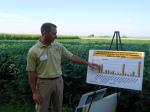ALBANY, Mo. – Farmers can see a drainage tile installation, hear long-term strategies for controlling resistant waterhemp, learn about cover crop options and several other strategies to recover from this season’s drought at the University of Missouri Hundley-Whaley Research Center’s annual field day, Wednesday, Aug. 29.
Missouri Land Improvement Contractors Association (MLICA) will install drainage tiles at the center so producers can see the process. Kelly Nelson, MU research agronomist, will discuss yield results and soil and water quality improvement with managed drainage and subirrigation from ongoing trials at Greenley Memorial Research Center near Novelty, Mo.
Above the surface, cover crops can be a great resource for improving soils, controlling erosion or as winter forage. “Choosing the right crop for your needs is important; we definitely don’t want to choose something that’s going to be a weed we have to control five years down the road,” said Charles Ellis, natural resources engineer for MU Extension. Ellis will discuss how to establish cover crops, research trials on different planting dates and how to select the right species or group of species to meet farmers’ management goals.
Establishing winter forages and stretching current supplies are concerns of many Missouri beef and dairy producers this season. Shawn Deering, MU livestock specialist, will cover steps they can take to stretch forage supplies, such as early weaning, strategic culling and using supplemental feed safely and efficiently.
Herbicide-resistant but seemingly drought-tolerant weeds continue to present challenges for Missouri farmers as well. Kevin Bradley, MU weed scientist, will describe multiple modes of action to address the toughest weeds and explain how pre-emergence herbicides can greatly reduce waterhemp density. Bradley will also provide an update on new products coming to the market in the next few years.
More than a dozen crop, weed, forage and livestock experts will provide strategies to help producers address current field conditions and plan for future seasons. The event will feature three tours from 9 a.m. to noon, followed by a free lunch.
The center, located in Albany, Mo., is part of a network of MU research centers across Missouri, extending the College of Agriculture, Food and Natural Resources’ (CAFNR) research to more than 14,000 acres to meet the regional research and demonstration needs of agricultural producers and natural resource managers.
For more information, contact Bruce Burdick at 660-726-5610 or [email protected]. For detailed directions and information, visit http://aes.missouri.edu/hundwhal/.
CAFNR is changing the core components of society that impact what we eat, where we live and how we’ll face tomorrow. As the University of Missouri’s College of Agriculture, Food and Natural Resources, we are at the forefront of research and education, working toward global sustainability.
Read more http://extension.missouri.edu/news/DisplayStory.aspx?N=1503





